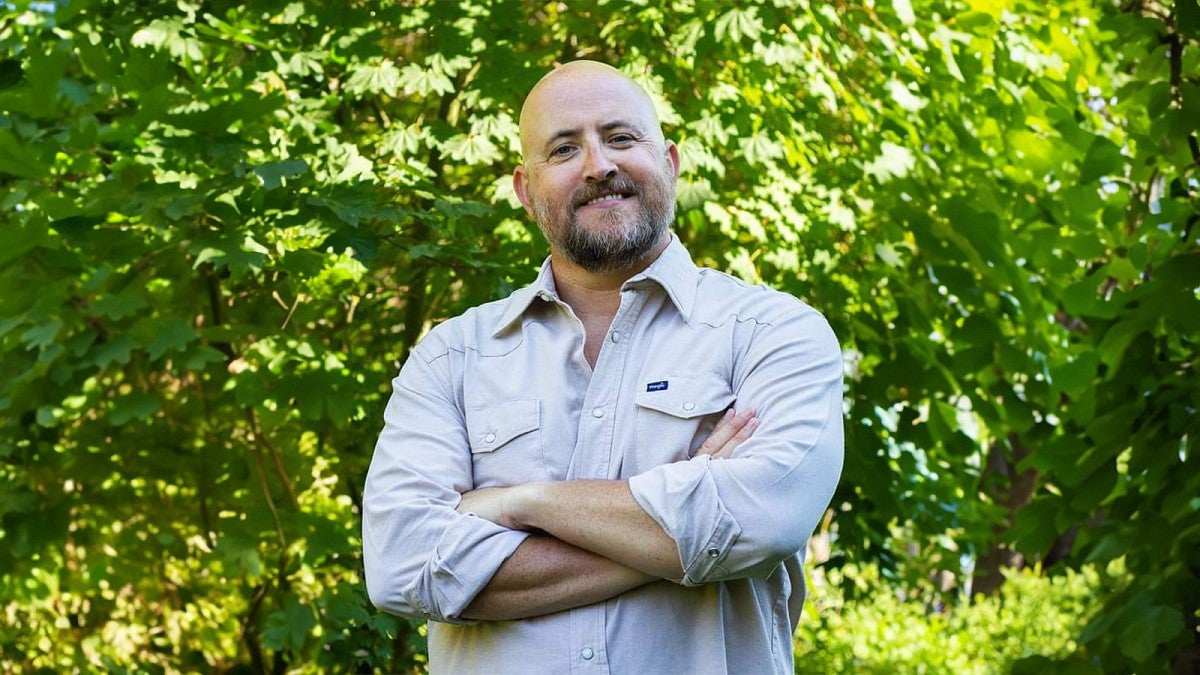
February 28, 2024 - 10:00 am
A three-year endowment fund is supporting a University of Oregon professor’s work on his family’s Cherokee oral history and material archives to better understand Cherokee Nation literature, history, intellectual production, and lived experience in the 20th and 21st centuries.
Kirby Brown is the recipient of the David M. and Nancy L. Petrone Faculty Scholar endowment. Brown is an associate professor of Native American and Indigenous literary and cultural production in the Department of English and the director of Native American and Indigenous studies in the College of Arts and Sciences.
The endowment will support Brown, an enrolled citizen of the Cherokee Nation, on his current research project that puts previous and ongoing work by Cherokee writers, artists, and public intellectuals in conversations with on-the-ground experiences of his grandfather’s generation of Cherokee citizens. With the funding, Brown is planning research trips to northeast Oklahoma, north Texas, and other sites to do archival research, conduct family interviews, and reconnect with Cherokee homeplaces.
“It’s going to allow me to build on the archival research I’ve done, to take photos of significant places where my grandad was born, and to reconnect with the allotment lands that he, his father and mother, and their extended family received after the Curtis Act of 1898,” Brown said.
Applying the Allotment Act of 1887 to tribal nations in Indian Territory, the Curtis Act of 1898 broke up lands held collectively by tribal nations into individual tracks of land to encourage assimilation and to force Western notions of land management, private property ownership, and nuclear family structures. There’s a growing methodology within Native American and Indigenous studies for scholars to center knowledge and stories within families and communities rather than solely on archival or academic work, Brown said.
For Brown, this means documenting the stories that he recalls his grandfather telling him, his cousins, and his sisters; speaking with extended family about their relatives, lives, and experiences, and correlating that knowledge with existing documentary and genealogical records.
“Our Nations are first and foremost a confederation of families,” Brown said. “We can’t tell a national story without telling stories about our families, and that’s especially true in Cherokee Nation.”
Native American storytelling isn’t limited to specific genres or modes, Brown said. It’s all weaved, including ceremony, song, dance, beadwork—and more.
“All of those are methods and ways of conveying story in different forms,” he said. “To tell a full story, we have to kind of use all of the genres and all of the forms at our disposal, and not privilege one over the other, not privilege the written word over the oral word, not privilege capital ‘L’ literature over popular literature, other forms of telling stories.”
Whenever Brown meets someone in Oklahoma, one of the first questions that comes up is, “Who’s your family?” These questions allow others to situate each other, he said. Scholars in fields such as Indigenous, race and ethnic studies and Native American studies, have studied literature in oral tradition and written forms.
“We've got these massive written and oral, literary and intellectual traditions that we can think of as national literatures in their own right, we've got these massive archives that we've recovered, and that we've built out over the last probably 30 years,” Brown said. “I think you’ll see more and more Native studies scholars recentering discussions of nationhood in our families, and not just in our tribal governments.”
—By Henry Houston, College of Arts and Sciences
